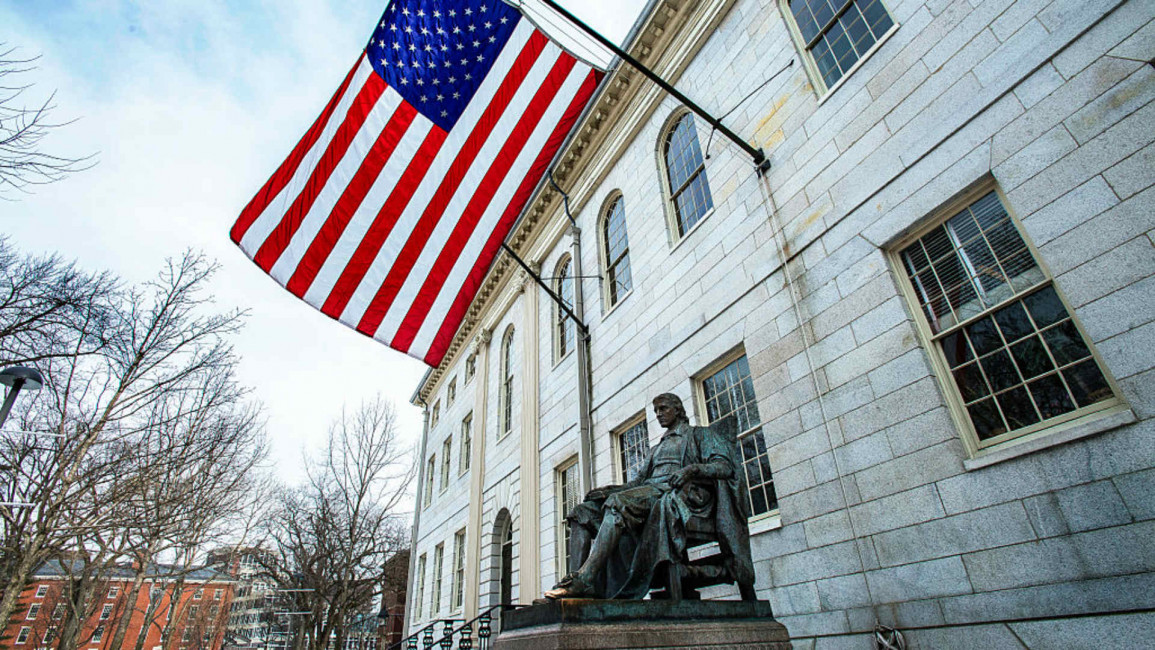
In Trump's US, all Palestinians are suspect - Harvard students or not
While the dehumanisation and systematic rejection of migrants - particularly those associated with Muslim majority countries under the auspices of the War on Terror and the more recent Muslim Ban - is something that the world has become accustomed to, the justifications for it are becoming more and more astounding.
Ajjawi was interrogated for hours and questioned over what US Customs and Border Protection (CBP) considered to be anti-US posts made on social media by his friends.
The presumption of guilt imposed upon racialised, migrant, and Muslim people - to say nothing of Palestinians specifically - is built into the system and gives rise to such incomprehensible situations.
It is only because these groups are already and always considered to be suspect, dangerous and criminal in some way, that the social media activity of their friends can become the grounds on which they are denied not only entry to a country, but the possibility to study.
The prospective student, who has secured the Hope Fund undergraduate scholarship by US non-profit Amideast, had to face the degrading xenophobic treatment of the American border, then have his future ripped from his grasp, reportedly over views that others held and had posted about.
As if the practice of border agents scouring through social media to decide whether to admit someone into a country wasn't reprehensible enough, also applying the criteria to their acquaintances is simply ridiculous.
Such practices would be laughable if they didn't inflict so much pain and trauma on the victims. One almost wonders why the US border forces bother to even provide an excuse at all.
 |
Ajjawi's presence on American soil, and in one of the country's most prestigious institutions is also of symbolic importance |  |
Let's face it, the teenager is Palestinian, a migrant and a perceived to be a Muslim from a part of the world that Trump has been all too happy to demonise as barbaric and violent land.
That is after all his real crime.
The US State Department in 2018 alone, rejected over 37,000 visa applications under the guidelines set up by the Muslim Ban. This was 36,000 more than the previous year.
Furthermore, the case demonstrates the growing correlation between the treatment of migrants, Muslims and racialised people, with attempts of political repression.
Twitter Post
|
The precarious position of migrants in the US, the total annihilation of their rights and freedoms, means that using the ridiculous "guilty by association" excuse is first trialled on those who are endlessly targeted and silenced, because they are more often than not considered unlikely to make a fuss or trigger outrage.
The method of collective punishment - something Palestinians, migrants and Muslims now know all too well - then spreads to wider communities, groups and networks within the domestic space.
First, those who show any sense of political opposition, then those seeking to protect civil liberties, freedoms and the most basic international laws.
The fact that Ajjawi is Palestinian of course makes all of this so much more acute. Trump's administration has waged an ruthless war on the Palestinian people - moving the US embassy to occupied Jerusalem, cutting funding to Palestinian refugees, attacking Palestinian civil society in the US, and moving towards his so-called Deal of the Century which will deprive Palestinians of even the most limited crumbs of support from Arab regimes and international organisations.
Trump's administration is carrying out the US' historic oppression of Palestinians on steroids. Ajjawi's presence on American soil, and in one of the country's most prestigious institutions is also of symbolic importance – as has his deportation and his denial of study.
There is of course a bitter irony here, also.
In the United States and across the world we have seen gruesome mass shootings take place one after the other, increasingly directed at Muslim and Latino communities. These attacks have risen in parallel with the growth of the far right across the world.
As the Islamophobic policies of western governments, or those of their Indian and Chinese counterparts, in the context of the so-called War on Terror continue to intensify, as politicians rail against Islamic extremism and Muslims supposed refusal to integrate, as the targeting of presumed Muslims in public life, on borders, and in public institutions increases, so does the likelihood of 'lone gunmen' to take things into their own hands and exact revenge.
 |
While a Palestinian teenager is held responsible for all his social media contacts, a racist politician bears no responsibility whatsoever |  |
Similarly, as the US political elite and media repeatedly describe Latino migrants as invaders, cockroaches and diseases, they encourage people to defend themselves and take deadly action.
While this might seem obvious, the connection between official, structural, and elite racism on the one hand, and violent street based racist attacks on the other is repeatedly denied by pundits and government officials alike.
While a Palestinian teenager is held responsible for all his social media contacts, a racist politician bears no responsibility whatsoever for the actions taken by those who are inspired to take action by their rhetoric and policies.
Malia Bouattia is an activist, a former president of the National Union of Students, and co-founder of the Students not Suspects/Educators not Informants Network.
Follow her on Twitter: @MaliaBouattia
Opinions expressed in this article remain those of the author and do not necessarily represent those of The New Arab, its editorial board or staff.




